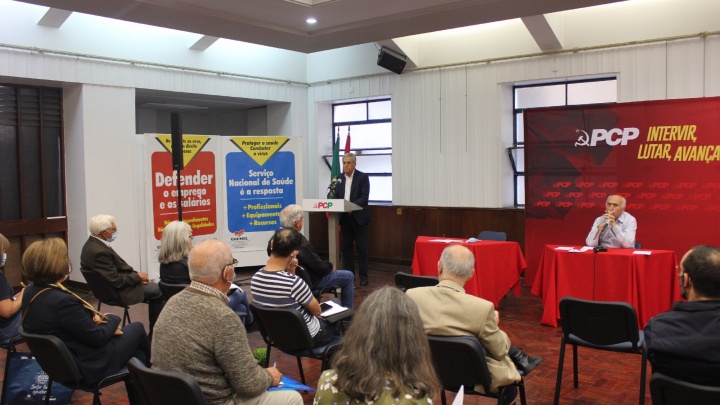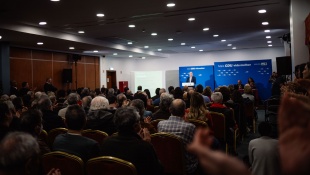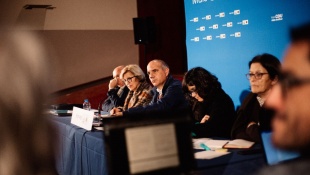We have long faced and fought, in Portugal, against the serious scourge of poverty and social inequalities.
At its root is a virus, older than the dangerous and deadly virus of Covid-19 - the virus of exploitation and the policies that feed it.
It is a scourge that has taken on and takes on enormous gravity, both for its size and for its persistence in our country.
It is true that during the last 4/5 years after the period of the Pact of Aggression it was possible to contain its negative evolution and even reverse it, as a result of the implementation of the policy of restoration and achievement of rights and incomes for which the PCP fought. A reversal of a small scale and which is now worsening again in the context of the epidemic outbreak and the insufficient social policies implemented to contain its negative effects.
It is worth remembering that, in 2018, around 17.2% of the population, according to the INE – Bureau of Statistics, faced a risk of poverty in Portugal. These are Portuguese who survived with an income below 501 euros per month. As it is important to mention that the social payments related to illness, unemployment, among other social benefits, contributed significantly for the reduction of the risk of poverty in our country.
We have no doubts that the recovery of income and rights that was possible to achieve between 2016 and March 2020, with the decisive contribution of the PCP and the wide struggle of the workers and our people, resulted in an improvement in living conditions and a deterrent on the increase of poverty in Portugal.
The valorisation of wages and the National Minimum Wage, although insufficient and far below the proposals of the PCP, the creation of jobs, the materialisation for four consecutive years of a special increase in pensions, the valorisation of long contributory careers, the improvement of social protection in unemployment, the increase of family allowances for children and young people, prenatal allowance, the rights of people with disabilities, among others, weighed positively in this evolution, as will the already adopted PCP’s proposal of free daycare for children up to the age of 3 for families in the first income bracket and for the second child in the second bracket.
It confirmed that the valorisation of wages, pensions and social benefits is a decisive factor, but not the only one, to reduce social inequalities and fight poverty, even though these have fallen far short of the needs and possibilities due to the PS government’s choice, which rejected a wide range of PCP’s proposals that aimed at more significant advances in combating the main causes of poverty and inequality.
Causes that are known and that lie in decades of right-wing policy subordinated to the European Union's guidelines based on labour exploitation, low wages, precarious labour, an unfair distribution of income between capital and labour, alongside the continuous transfer of public resources to private business to the detriment of a strong commitment to the public Social Security system, the National Health Service, among other public services.
They are responsible for the existence of more than two million Portuguese people to remain subject to the denial of fundamental rights and deprived from having a decent life. They are mainly workers who become impoverished while working, the unemployed, elderly people with low pensions, families with children and single parents.
In April 2019, more than one in four workers received the National Minimum Wage; one in five workers had precarious contracts; half of the unemployed were without social protection from unemployment, mainly due to precarious employment; high long-term unemployment; 10% of poor workers.
The situation that exists today as a result of the Covid-19 epidemic and the use that great interests make of it, reveals new and real dangers of a huge escalation of social inequalities and poverty. Real dangers to which the PS government's options do not provide the necessary response, falling short of what was necessary to combat them. At the same time riding on the back of the epidemic outbreak emerge those who see it as an opportunity to justify the increase in labour exploitation and their profits, at the expense of worsening social inequalities and the impoverishment of vast layers of the population: the thousands of workers under unemployment, the approximately one million who had cuts in wages, the micro and small entrepreneurs whose activity has been suspended or is limited and run the risk of ruin.
Many thousands who join those who have no prospect of a way out of the spiral of poverty in which they have lived.
The government continues to have as prevailing options the transfer of public resources to big capital, as seen with the drain of funds under the lay-off scheme for economic groups and multinationals, which do not shy from using them to buy assets or distributing dividends among its shareholders; the promotion of exemption for companies from social security payments affecting its financing; the maintenance of prerogatives for PPP holders and the continuation of the banquet of millions diverted to Novo Banco and the speculative fund that holds it.
The highly trumpeted 15.5 billion euros that Portugal may receive from the new European Union recovery fund are not only lower than the more than 25 billion euros in interest on the debt that Portugal in the same four-year period will pay, while this fund will represent, in the future, new national costs and new concessions in sovereignty as is being announced.
Riding on the back of the epidemic outbreak, big capital and the political and social forces emanating from it or that converge with it resume the old theory of inevitabilities and in the shadow of the necessary sanitary measures, promote inaction and resignation, with the stigmatization of those who struggle in defence of their rights. We have already said and repeated, the country is today faced with the intensification of the virus of exploitation, inequality and poverty, against which we must act and fight!
And if we affirm the imperative need to act against this virus, which is increasingly visible in the reality of the country, do not think that we underestimate the epidemic outbreak and its consequences on the health and life of the populations.
Its prevention and combat in health and medical terms is a necessity and confirms the irreplaceable role of the National Health Service. It is, in all circumstances, and also in this exceptional situation, an anchor in the fight against social inequalities and poverty, by ensuring that no one is excluded from medical support, either in the context of the epidemic or in the right to treatment and healthcare in general.
That is why the PCP has battled with very concrete proposals aimed at strengthening it, highlighting the need to adopt now an Emergency Plan for the National Health Service with the adoption of special measures for the recruitment of health professionals, to strengthen the response capacity for patients with Covid-19 and patients with other pathologies, and at the same time ensure the resumption of healthcare that has been suspended.
An Emergency Plan that covers all healthcare units of the NHS, provides primary healthcare, hospital care and long-term care.
The prevention and fight against Covid-19 shows the value of the struggle that has been fought over the years in Portugal, which has had a fundamental ally in the PCP, against the right-wing policy that seeks to weaken it by transferring important shares of public financial resources to private business.
It is not irrelevant to verify the nature of the economic and social policies that are adopted in the exceptional situation that we live in. The economic and social consequences of the outbreak are not neutral. It is therefore essential to provide short-term responses that address the seriousness of the situation.
That is what we have been doing. That is what we will continue to do in the framework of the debate on the Budget Amendment, now presented by the PS government, in order to overcome the insufficient measures that are contained in its recently adopted Economic and Social Stability Programme. A Programme that fell far short in responding to pressing economic and social problems, namely in relation to defending wages and employment and in responding to the many who were left without any means of subsistence and who daily increase the worrying pocket of poverty, which need to be urgently addressed with the creation of a social allowance of 438 euros, as proposed by the PCP.
Facing the epidemic outbreak requires that public Social Security to be a factor of solidarity, social justice and stability for all Portuguese people, combined with an economic policy geared to job growth; for the general increase in wages and the National Minimum Wage, a combat against precarious employment.
The exceptional situation that we are experiencing requires the improvement of social protection in unemployment, but also the basic rights of citizens, through the attribution of non-contributory benefits to the most vulnerable or economically deprived people within the scope of the social protection and citizenship system (social security system).
In other words, it is necessary to face poverty, not only with social buffers, based on aid, but to create the levers that enable those who are in this situation to free themselves from this attack on their fundamental rights and prevent more Portuguese from being thrown into this situation.
It is essential to ensure that contributory revenues are not used for purposes other than Social Security, ending with the multiplicity of cuts and exemptions from the payment of the Single Social Tax. However, given the scale of the problems, it is not possible to respond to economic and social development without answering the fundamental questions that arise, namely: the risks of mass bankruptcies; the significant reduction in purchasing power of the population and its social and economic impacts; the increase in the prices of basic necessities; the problems and limitations of public services; the processes of even greater concentration and centralisation of capital, contrary to national interests.
The main and most important condition for economic recovery is the defence of the economic fabric, the valorisation of wages, pensions and incomes of the workers and people.
In the last three months the PCP has presented a wide range of proposals that aim to guarantee the full payment of workers' wages under lay-off, expanding free of charge daycare centres and similar solutions, creating income support for micro and individual entrepreneurs, guarantee of social protection for workers in temporary work agencies, taxi workers and domestic service workers, extension of the social unemployment benefit, among many others. Most of these proposals were rejected by the PS. But we will not give up on them aware of their need, possibility and justice.
The fight against exploitation, social inequality and poverty requires a new policy - the patriotic and left-wing policy - that the PCP advocates. It is with it that we will walk the path of eradication of poverty, inseparable from a fair distribution of wealth to the workers and their families, raising their wages, fighting unemployment and creating quality jobs, with consolidation of the role of public systems of Social Security, National Health Service, Public Schools.
For the PCP, the fight for the eradication of poverty requires the valorisation of pensions, the implementation of the right to decent housing, with the reduction of its costs in the expenses of families and the abolition of healthcare co-payments.
Promote appropriate measures to protect children and youth at risk, homeless citizens, among other situations of risk of poverty and social exclusion.
Responding to situations of poverty and social exclusion based on guaranteeing basic rights and supporting life projects, with economic and social autonomy, without prejudice to social emergency measures to respond to the most acute and immediate situations.
Because poverty is not a historical and social fatality, it is essential to face it in the present to eliminate it in the future.




